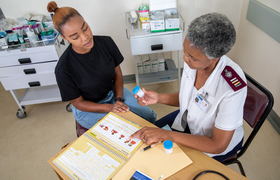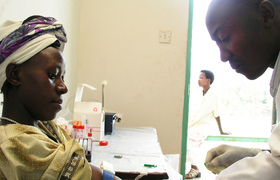UCT academy empowers women with multi-conditions
09 September 2025 | Story Myolisi Gophe Photos Je’nine May. Read time 6 min.
It was a graduation ceremony with a difference. The Bertha House Hall in Observatory was filled with a mix of emotions on 30 August as 13 women – all living with multiple long-term conditions (MLTCs) – donned their graduation sashes for the first time.
The occasion marked the closing of a three-year Advocacy Skills Programme, hosted under the University of Cape Town’s (UCT) Knowledge Translation Unit (KTU), and formed part of the National Institute for Health and Care Research (NIHR)–funded study “Evidence-led Co-created Health Systems Intervention for MLTC Care”.
The Advocacy Academy was established in 2022 to ensure that people with lived experience of multiple chronic conditions were not only heard but also actively involved in shaping health interventions. Over the past three years, participants contributed to the design and oversight of a trial implemented in 32 clinics across the Western Cape and KwaZulu-Natal.
“Instead of being passive recipients of care, these women became change-makers,” said Professor Lynne Hendricks of Stellenbosch University in her keynote address. “They shaped how clinical tools, patient diaries and community health worker support mechanisms were designed. Their experiences directly informed how health systems can respond more effectively to the reality of living with more than one chronic condition.”
“The academy equipped these women to advocate not only for themselves but also for the millions of others navigating complex health journeys.”
One of the major outcomes of their involvement was the adaptation of clinical decision-support tools used by nurses and doctors to better account for patients with multiple conditions. Participants also helped design a patient health diary that empowers individuals to track their treatments and understand their conditions.
Building advocates and leaders
But the Advocacy Academy went beyond research. It was also a capacity-strengthening programme, tailored to the needs of its members. Participants completed courses in advocacy, public speaking, treatment literacy and leadership. Additional training modules were added as members identified personal development goals.
“Much of the advocacy landscape in South Africa has focused on single diseases like HIV or TB [tuberculosis],” explained Robyn Curran, a senior research officer at the KTU. “But many people live with more than one condition at a time – diabetes, hypertension, HIV, asthma, TB, and others. The academy equipped these women to advocate not only for themselves but also for the millions of others navigating complex health journeys.”
We laughed, we cried, we healed. We carried each other through our losses and celebrated our victories. That is why today is not just an ending. It is a beginning.”
For the graduates, the journey was life changing. Kashiefa Mohammed from Hanover Park joined the programme just after her youngest son was murdered in what was believed to be a gang-related incident. “When I started, I was a broken woman. I just wanted someone to listen to my voice and understand my pain. I could not find anyone in the community of Hanover Park, and I’ve been a community activist for more than 40 years now. When I came to the academy, I realised that this was a new community for me. As the time passed, I became relaxed.
“After every workshop, I go to Hanover Park and engage with various stakeholders to show that things should be done differently. This academy has taught me to find myself. Now I know my voice has power, and it can help change how clinics serve people like me.”
Pamela Mala, another graduate, shared how the programme gave her courage through hardship. “I contracted TB for the fourth time while on this journey. I was in denial at first, but through the support of my sisters here, I learnt to face my conditions, to name them, and to keep fighting. Today I stand not only as a survivor but as an advocate.”
Stories that statistics cannot capture
One of the strongest contributions of the Advocacy Academy has been its ability to surface lived experiences that often remain invisible in data. Participants spoke about the daily challenges of managing multiple treatments, the exhaustion of constant clinic visits, and the stigma still attached to certain conditions.
“Numbers alone cannot capture what it means to wake up every day knowing you have to take 10 tablets, walk long distances to the clinic, or miss work for medical appointments,” said Professor Hendricks. “Through their voices, we gained a deeper understanding of the human cost – and the resilience – behind the statistics.”
The academy also created a rare space of solidarity. “We laughed, we cried, we healed,” said Mala. “We carried each other through our losses and celebrated our victories. That is why today is not just an ending. It is a beginning.”
The graduation ceremony was filled with celebration, song and testimony. Family members and friends beamed with pride as the women crossed the stage. For some, it was the first time they had ever been publicly recognised for an achievement.
“This moment belongs to you and your families,” Hendricks told the graduates. “You committed hours you could have spent with your children or resting from your conditions. Instead, you invested in building leadership and advocacy. That is courageous leadership – the kind that changes health systems from the ground up.”
While the research project that housed the Advocacy Academy is ending, its impact will be felt far beyond the study. The tools co-created with participants are already being used in clinics, and their advocacy skills will continue to ripple into communities, support groups and policy spaces.
“This graduation is not the end,” Curran emphasised. “We have worked to ensure that the skills and networks built here will sustain beyond the study. These women will continue to be advocates – in their homes, their clinics, and in broader society.”
As South Africa grapples with rising rates of non-communicable diseases alongside infectious diseases like TB and HIV, the need for health systems to respond to patients with multiple overlapping conditions has never been greater. The graduates are already demonstrating what patient-centred health system strengthening can look like.
“Every health system reform must begin with listening to the people most affected,” Hendricks reminded the audience. “The Advocacy Academy is proof that when you create space for lived experience, you not only gather evidence but also grow leaders. And these leaders will change the future of healthcare.”
 This work is licensed under a Creative Commons Attribution-NoDerivatives 4.0 International License.
This work is licensed under a Creative Commons Attribution-NoDerivatives 4.0 International License.
Please view the republishing articles page for more information.




















